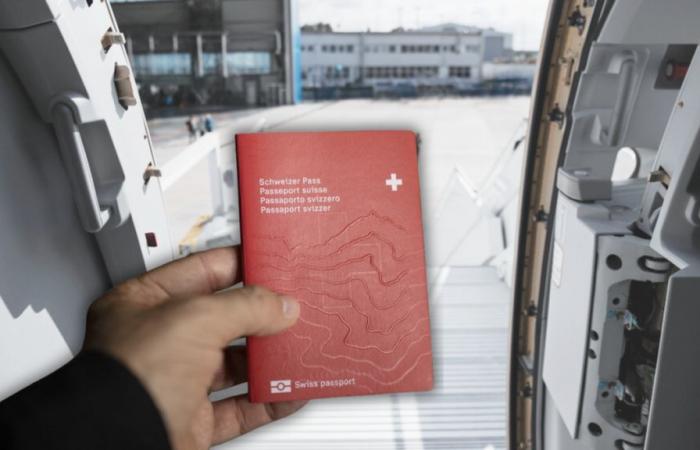The “Passenger Name Record” system aims to combat terrorism and serious crime.Image: Keystone/Shutterstock
The National Council approved this Tuesday the introduction of a national database for air passengers. A system that has already been adopted in the EU and the United States.
17.12.2024, 12:2617.12.2024, 12:41
Switzerland should introduce a national air passenger database. The National approved on Tuesday, by 166 votes to 25, a Federal Council project to this effect. However, he provided some clarifications. The file goes to the Council of States.
The law will make it possible to set up the “Passenger Name Record” (PNR) system, already adopted in the EU and the United States in particular. It is an established instrument in the fight against terrorism and serious crime, argued several speakers from all sides. Experience has shown that the system is effective, said Justice Minister Beat Jans.
If Switzerland does not follow, it could become a fault in the middle of Europe, it was repeated. People could bypass the EU system by flying to Switzerland and continuing their journey within the Schengen area by land.
In addition, more and more states are threatening to impose heavy fines on Swiss airlines that do not communicate PNR data, or even to withdraw their landing rights. Andrea Zryd (PS/BE) feared negative economic repercussions. Without this law, Swiss companies would be at a disadvantage, added Walter Gartmann (UDC/SG).
The use of the PNR is also one of the United States’ conditions for maintaining Switzerland in the visa waiver program. This allows Swiss nationals to travel to the United States without a visa for professional or tourist purposes for up to 90 days.
No more than six months
The data concerned is that which passengers provide when booking: first name, last name, contact reference, itinerary, method of payment. Information concerning sensitive personal data (skin color, membership of a union or dietary preferences for example) will not be communicated.
Concerning the duration of data retention, those showing no indication of a terrorist offense or another serious criminal offense will not be recorded for more than six months. They will also be pseudonymised after one month.
The left and the PVL wanted to strengthen data protection, with immediate pseudonymization of data or a renunciation of data retention. Gerhard Andrey (Vert-es/FR) called for a balance between the political desire for security and data protection.
The Federal Council has already ensured this balance, Jans countered. For the commission, Thomas Hurter (UDC/SH) rejected a “Swiss finish”.
The alliance also wanted the examination of risk profiles to be carried out by the Federal Administrative Court rather than by the Federal Council. Patrick Hässig (PVL/ZH) highlighted respect for the separation of powers. It is about “strengthening confidence in the State”.
What about private jets?
The project targets commercial aviation. The PS and the PVL have once again failed to subdue non-commercial aviation as well.
Criminals are aware of this difference and can travel by private jet, launched Hasan Candan (PS/LU). Hurter, on the contrary, considered that this extension would make the law more difficult to apply in practice.
A proposal intended to restrict the circle of states with which the Federal Council can conclude international treaties on the reciprocal communication of data did not pass muster either. “We must under no circumstances support persecution in authoritarian states,” argued Marionna Schlatter (Vert-es/ZH), in vain.
Relative costs
A new service, specialized in processing PNR data and attached to the federal police, will be active from 2026. This passenger information unit (UIP) will be created in 2025.
Half of the IPU’s employees will be seconded by the cantons, which bear the costs relating to this commitment. The IPU will receive data from companies a first time 24 to 48 hours before the departure of a flight to or from Switzerland, and a second time just before it.
The service will automatically compare the data with that from police information systems. In the event of a match (a person flagged for arrest appearing on a passenger list), the result will be checked manually before being transmitted to the federal and cantonal authorities.
The categories of offenses are specified in the law: terrorism, membership in a criminal organization, human trafficking, sexual exploitation of children or child pornography, arms trafficking, money laundering, cybercrime, intentional homicide, among others. ‘others.
Le National made several clarifications to the government version. For example, companies are obliged to report data only for flights they carry out themselves. In addition, companies must only collect the data they actually need to process the reservation.






